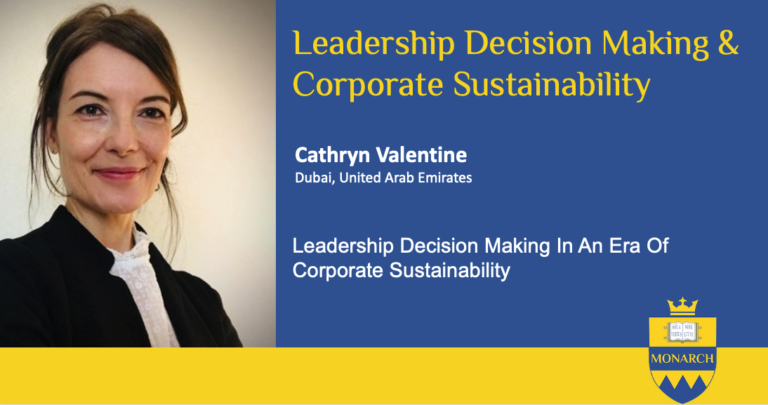Leadership Decision Making in an Era of Corporate Sustainability

Monarch is happy to announce the recently authorised research proposal by PhD in Leadership Candidate Ms. Cathryn Valetine. Her research focuses on the leadership decision making in relation to corporate sustainability factors and goals.
The Research
Corporate Social Responsibility (CSR) matured over the last years. We have entered an era of global business responsibility where a growing number of ESG (environmental, social, and governance) laws and regulations are pushing multinational corporations (MNCs) to ‘adapt or die’. This evolution appears to be based on two primary arguments. The first being the case for the long-term survival of our species: a compelling case, with an abundance of mounting environmental evidence to support it. The second is more subtle: a global shift in orientation towards ‘post-materialist values’, such as social justice, self-expression, and tolerance (Inglehart, 1997). This shift, recorded by social scientists since the 1970s, was largely driven by a younger population while their parents still cared for ‘materialist’ values such as financial success, security and individual achievements (Diermeier, 2022). The new context for doing business, is a situation numerous companies have embraced and some continue to reject. Many more may still be ‘on the fence’. Regardless, the evidence suggests that the strategic questions for business have moved on from understanding the need to change, to the realities of how it can, and should, be done (IBM Institute for Business Value, 2022).
According to an African proverb, ‘when the music changes, so must the dance’. An important feature of corporate sustainability (CS) as an emerging business paradigm is the role and responsibilities of the business leader, who is increasingly under pressure to act, and to be seen to be acting, in a more responsible fashion. While the understanding of what constitutes responsible leadership (RL) in practice is still emerging, it would appear to demand an important internal shift from a shareholder mindset to that of a stakeholder orientation (Maak & Pless, 2006). With leaders responsible for the management of an ever-increasing number and diversity of stakeholder groups an ability to understand different moral motivations and incorporate them into corporate decision-making will be required (Diermeier, 2022; Paine, 2022; Muff et al.,2020; Painter-Morland, 2008).
The contemplated research will explore the future directions of traditional business decision-making in MNCs, in the context of their transformation to sustainability. The data will be analyzed and interpreted to inform a new or adapted model to guide leaders at all levels. Adoption of such a model may serve to mitigate reputational and financial risk to companies as well as contribute to the character development of individual leaders over time.
The Researcher
 Ms. Cathryn Valentine is a Candidate within the Professional PhD in Leadership Program. She is a leadership development expert and coach with over 20 years experience. She holds a Bachelor of Arts in Industrial Relations from the University of South Africa and a National Diploma in Human Resource Management from Cape University of Technology. At present, she holds the position of Lead Faculty at the Center for Creative Leadership in Brussels, UAE and Africa. She has lead coaching and leadership mandates for various clients including: Investment Funds, Yara International, DLA Piper, WABCO, and the British Council.
Ms. Cathryn Valentine is a Candidate within the Professional PhD in Leadership Program. She is a leadership development expert and coach with over 20 years experience. She holds a Bachelor of Arts in Industrial Relations from the University of South Africa and a National Diploma in Human Resource Management from Cape University of Technology. At present, she holds the position of Lead Faculty at the Center for Creative Leadership in Brussels, UAE and Africa. She has lead coaching and leadership mandates for various clients including: Investment Funds, Yara International, DLA Piper, WABCO, and the British Council.
